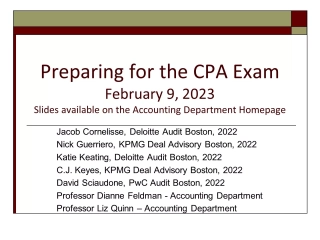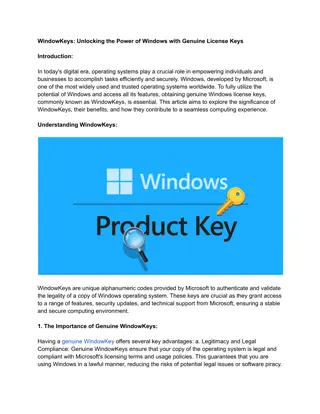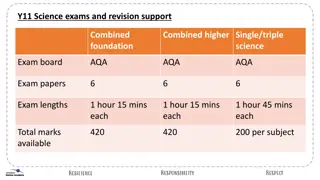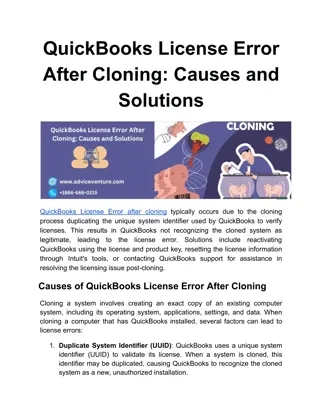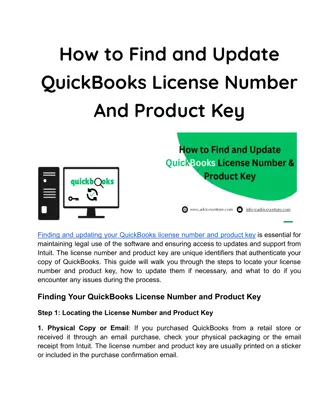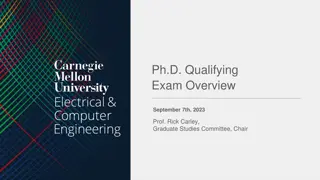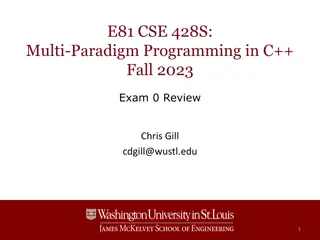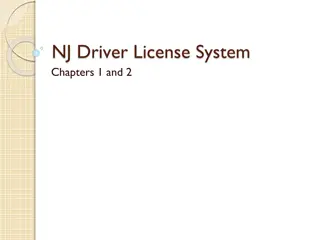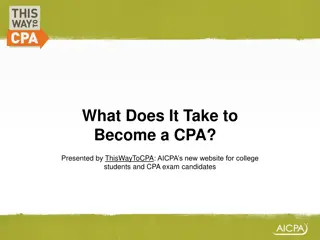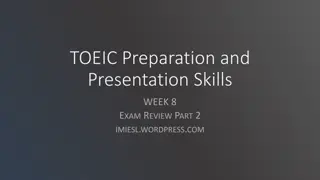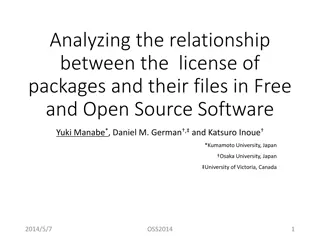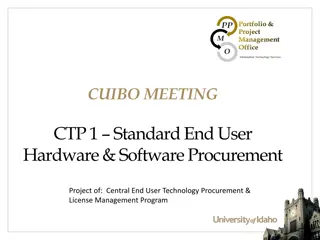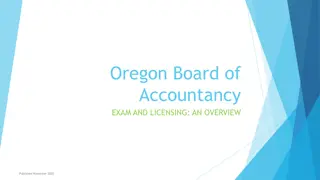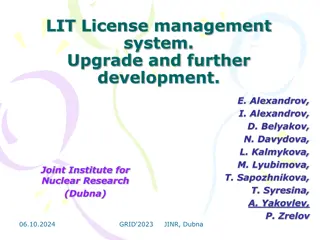Overview of the CPA Exam and License Process
The CPA Exam is a crucial step toward obtaining a CPA license, allowing individuals to practice as CPAs in the U.S. The exam is regulated by the AICPA and administered by NASBA and Prometric. To become a CPA, one must meet specific education, examination, and experience requirements set by individual jurisdictions. This comprehensive process ensures that only qualified professionals are granted the prestigious CPA credential.
Download Presentation

Please find below an Image/Link to download the presentation.
The content on the website is provided AS IS for your information and personal use only. It may not be sold, licensed, or shared on other websites without obtaining consent from the author.If you encounter any issues during the download, it is possible that the publisher has removed the file from their server.
You are allowed to download the files provided on this website for personal or commercial use, subject to the condition that they are used lawfully. All files are the property of their respective owners.
The content on the website is provided AS IS for your information and personal use only. It may not be sold, licensed, or shared on other websites without obtaining consent from the author.
E N D
Presentation Transcript
Preparing for the CPA Exam February 17, 2022 Slides available on the Accounting Department Homepage Caroline Barrett, 2021 RSM Audit Boston Andre Glascock, 2021 PwC Audit Boston Chris Paiva, 2021 EY Audit Boston Jack Twomey, 2021 PwC Audit Boston Professor Dianne Feldman - Accounting Department Professor Liz Quinn Accounting Department
Agenda Panelist Introductions CPA License and Exam General Information The CPA Exam process, format and test taking Requirements to take the CPA Exam The Application Process Exam Coverage and Courses Timing and Order of Sections Q&A
Introductions & Contact Information Caroline Barrett: (781) 774-0709 Andre Glascock: (305) 310-9152 Chris Paiva: (401) 588-0305 Jack Twomey: (617) 480-6494
The CPA License The CPA credential is a license issued by one of the 55 states or territories of the U.S. that authorizes the holder to practice as a CPA in that jurisdiction. To become a CPA, you must be declared eligible for the examination, and subsequently licensed, by the Board of Accountancy in one of the 50 U.S. states or 5 jurisdictions. One component of the licensing requirement designed to ensure only qualified individuals become licensed as CPAs is the Uniform CPA Examination. The Constitution of the U.S. grants each state or territory the power to regulate the practice of the professions within that jurisdiction s borders. Each jurisdiction sets its own requirements for education, examination and experience.
CPA Exam: Players The American Institute of Certified Public Accountants (AICPA): The AICPA is the largest national, professional organization for CPAs. The AICPA provides members with resources. For the Uniform CPA Examination, the AICPA determines the content of the examination, prepares the examination questions, determines the method of scoring, prepares advisory scores and conducts statistical analyses of examination results. The National Association of State Boards of Accountancy (NASBA): The 55 U.S. and territorial Boards of Accountancy are the members of NASBA. NASBA exists to serve its members. NASBA takes on the role of a central clearinghouse where all jurisdictions submit information on eligible candidates and from which all jurisdictions receive advisory scores and other examination data. You may access the site here: NASBA CPA Central: You may request, complete and submit an application online in most states at: CPA Central Prometric: Prometric is the global leader in technology-enabled testing and assessment services for information technology certification, academic admissions and professional licensure and certifications such as the Uniform CPA exam. Prometric operates test centers around the world. Prometric
CPA Exam The Uniform Certified Public Accountant (CPA) Examination is developed by the AICPA with significant input and assistance by NASBA and state boards of accountancy. It is designed to assess the knowledge and skills entry-level CPAs need to practice public accountancy. On April 1, 2017, the AICPA launched the newest version of the Uniform CPA Examination, a four-section (AUD, BEC, FAR and REG), 16-hour assessment (four hours per section) that places a greater emphasis on testing a candidate s higher-order cognitive skills such as critical thinking, analytical ability, problem solving and professional skepticism. Auditing & Attestation (AUD) 4 hours Business Environment & Concepts (BEC) 4 hours Financial Accounting & Reporting (FAR) 4 hours Regulation (Tax & Business Law) (REG) 4 hours
CPA Exam: General Information The requirements to take the CPA exam are a subset of the requirements to be licensed as a CPA. You can take the 4 different parts in any order. 75 is the passing grade. The computerized CPA exam is adaptive, i.e., the level of difficulty changes according to your performance. You may schedule your examination at any Prometric site in any of the jurisdictions. You do not have to sit in the same state where you applied to be licensed. Testing windows have been eliminated in most states, the exam in now administered on a continuous basis (not continuous yet: SC only). Once you pass one part of the exam, you have 18 months to complete the remaining parts. Otherwise, you will need to retake the part(s) that you passed that is (are) over 18 months old. If you do not pass a section, you no longer have to wait to reschedule, you may do so as soon as your official score is released (you can have 2 NTS open at same time).
CPA Exam: Question Formats The CPA exam employs a combination of question formats. It includes the traditional multiple choice questions and written responses, as well as highly innovative simulations questions that replicate workplace situations and require the application of knowledge and skills to arrive at solutions. Candidates will receive at least one research question (research-oriented TBS) in the AUD, FAR and REG sections that require the candidate to search the applicable authoritative literature and find an appropriate reference. Pretest items are used to develop future examinations. They are not used in computing examination scores. Any section may include pretest items.
CPA Exam: Testlets The exam sections are administered in five blocks called testlets, with MCQs and task based simulations (TBSs) in all sections and three written communication tasks only in BEC. The number of MCQs and TBSs vary depending upon the section. Tutorials and Sample Tests can be accessed at the AICPA website at: Sample Tests
CPA Examination Process CPA Central. Sample Tests Prometric CPA Exam
CPA Exam: Structure & Prometrics Arrive on-time, bring 2 valid forms of ID that exactly match your name (middle name can be initial) on the NTS (check the list of acceptable IDs on your NTS). Exam appointment includes 4 hours (exam time) + 30 minutes. Request a calculator if not provided. During each Exam section, candidates will be offered a standardized, 15 - minute break after the first TBS testlet, which is approximately the midpoint two hours. The Exam clock stops for the standardized break after the first TBS testlet is completed. A candidate may choose to decline the standardized break and continue testing, but the break will not be offered again. Optional breaks will continue to be available, but it counts against total testing time.
Sitting for the CPA: MA requirements Be at least 18 years old. Completion of at least 120 semester credit hours. Note: AP credits will not be included on your transcript until you graduate. Under updated regulations, MA candidates may apply for OR take an exam section 90 days before their official graduation date by providing a Certificate of Enrollment and by providing a Certified transcript within 90 days of taking the exam. Taken at least 21 Accounting credit hours including coverage in Financial accounting, Management (Cost) accounting, Taxation and Auditing. Taken at least 9 business credit hours with coverage in Finance, Business Law & Information Systems.
Sitting for the CPA: NY requirements Complete at least 120 semester credit hours. Note: AP credits will not be included on your transcript until you graduate. Unlike in MA, candidates must have completed 120 credit hours PRIOR to applying for the exam. Complete a course in each of the following: financial accounting, cost or management accounting, taxation, audit and attestation.
CPA Exam: Application Process Obtain Candidate Bulletin: 2022 Candidate Bulletin Send application forms to state you intend to practice (apply on-line for your state at www.nasba.org or directly to your Board of Accountancy). Note: Name on application must match the name on your ID.
CPA Exam: Application Materials An official transcript from each school listed on your application. Transcripts must be sent directly from your school(s) Student Services to CPA Examination Services (also send via mail is recommended). Note: Courses not taken at BC will NOT be on your BC transcript (you will send separate transcripts from these schools). The AP courses which BC accepted will appear on your BC transcript after you graduate. Be sure to respond to the email from Professor Ed Taylor at the end of your senior year to flip you AP credits upon graduation. Certificate of Enrollment, if applicable (in MA and select other states but not NY): This form is evidence that you are currently enrolled and that all courses and graduation requirements will be completed within 90 days of sitting for the exam. The form must be signed by an authorized official of the college (notarized) and signed by you. The official form can be downloaded from the NASBA website, do not use the BC form. Do not sign the form until you are with the notary and bring a photo ID (driver s license). The form must be sent directly from BC. Be sure to follow-up within 90 days!! Assistant Dean Sara Nunziata in the Undergraduate Dean s Office can notarize for you or you can go to BC Student Services.
CPA Exam: Application Materials NASBA Advisory Evaluation available in certain states including MA & NY Application and Exam Fees: Application Fee for First Time Candidates: @ $195 Examination fee will vary depending on the number of sections you are applying for (e.g. In MA $117 for one section, $137 for two sections, $157 for three sections and $177 for four sections). The cost of each exam is $200+ (varies by state e.g. $209 in Maine, $226 in Mass.) Note: You lose the exam fee if you do not take the exam applied for, so be careful how many exam sections you register for.
CPA Exam: Application Process Allow at least 8 weeks for NASBA (or the State Board of Accountancy) to process your application and send the Notice to Schedule (NTS). Shorter delay during off-season? Once your NTS is received, schedule exam(s) with Prometrics.com exam(s) can be taken anywhere in the U.S. Schedule 45 days in advance recommended, but no later than 5 days in advance. You must take before your NTS expires (in most states 6 months). NOTE: NTS must be brought to the exam, it also contains your launch code(s).
Examination Blueprints Examination Blueprints have been created for each of the Exam s four sections. The Blueprints contain approximately 600 representative tasks across the four sections. The purpose of the Blueprints is to: Document the minimum level of knowledge and skills required for licensure. Assist candidates in preparing for the Exam. Apprise educators of knowledge and skills candidates will require. Guide the development of Exam questions. The Blueprints can be accessed on the AICPA site: 2022 CPA Exam Blueprints
Auditing & Attestation covered in: ACCT3309 (Audit & Assurance) or ACCT8815 (Financial Auditing) ACCT6618 (Accounting Information Systems) ACCT4409 (Advanced Auditing) ACCT6634 (Ethics & Professionalism) ACCT6635 (Forensic Accounting) ACCT6640 (Dive, Dissect & Decide with Big Business Data) ACCT8825 (Assurance & Consulting Services)
Financial Accounting & Reporting: ACCT1021 (Financial Accounting) ACCT3301 (FAST 1) ACCT3302 (FAST 2) ACCT6601 (FAST 3) equivalent to Advanced Accounting ACCT3351 or ACCT8824 ( Financial Statement Analysis)
Business Environment & Concepts: ACCT1022 (Managerial Accounting) ACCT3307 (Managerial Cost Analysis) or ACCT8817 (Internal Cost Management) - MSA Also touches on: CSOM core classes (Finance, Operations Management and Economics primarily), AIS (ACCT6618), & Business Writing (ACCT5588 or 8810, or BCOM5588, 6688 or 8810)
Regulation: BSLW1021 (Business Law) ACCT4405 (Federal Taxation) ACCT6615 (Advanced Federal Taxation) BSLW1022 (Business Law II) or BSLW8803 (Business Law for CPAs) ACCT8826 (Taxes & Management Decisions)
When to take the exam Take the exam as soon as possible --- while you re still in a student or test-taking frame of mind. The longer you wait, the more likely it is for new standards to be adopted and for your test-taking skills to diminish (see first-time test taker results). You are significantly more likely to pass the exam if you sit within one year of graduation. Consider taking a section during Senior spring. BC students do very well on BEC and this section normally requires less study hours then the other sections. Word of caution!
BC Pass Rate all Candidates: 2014-2019 Overall CPA Exam Pass Rate - All Testing 100.00% 90.00% 81.00% 79.40% 80.00% 75.00% 74.10% 74.00% 72.00% 70.00% 60.00% 56.70% 56.30% 54.60% 54.30% 54.10% 53.30% 50.00% 52.80% 51.90% 49.80% 49.50% 48.70% 48.30% 40.00% 2019 2018 2017 2016 2015 2014 National Massachusetts Boston College
BC Pass Rate First Time Candidates: 2014-2019 CPA Exam Pass Rate - First Time Exam Candidates 100.00% 88.30% 90.00% 84.40% 82.50% 81.80% 79.70% 80.00% 72.00% 70.00% 62.90% 62.20% 59.90% 59.30% 59.20% 58.90% 60.00% 58.60% 57.50% 55.00% 55.00% 54.40% 52.90% 50.00% 40.00% 2019 2018 2017 2016 2015 2014 National Massachusetts Boston College
BC Pass Rate First Time Takers by Section: 2014-2019 BC Pass Rate First Time by Section 100.00% 94.90% 95.00% 90.00% 88.30% 85.40% 85.00% 84.60% 80.00% 75.00% 70.00% 65.00% 2019 2018 2017 2016 2015 2014 Audit BEC FAR REG
What order to take the exams? What classes will you be taking just before or during the review? Take that part of the exam that is most consistent with the classes you re taking. Avoid leaving the hardest sections (FAR or REG) for last. Remember, you only have 18 months from the time you pass the first part to get the rest of the parts completed. If you re taking the exam continuously, your mind and concentration start to lag after the first two parts. What to do if you fail a section?
When to register and exam order? When to register (BC Seniors): MA Candidates: Apply in mid to late March (6 month window for NTS) by completing Certificate of Enrollment. NY Candidates: Apply in mid to late March if you have 120 credits (not including APs) as of the beginning of Spring semester. Otherwise, must wait until graduation. Exam Order and Timing (Suggestion): Study late May and June for FAR or REG (most material and considered most challenging) 5 to 6 weeks. Take exam start of July. Study rest of July and early August 5 to 6 weeks. Take REG or FAR early-mid August. Study rest of August. Take BEC 2 to 3 weeks or AUD 4 weeks at the end of August or early-mid September (caution testing fatigue may set in). Study in September for last part. Take early October. Note: Audit best to take last if working in assurance.
CPA certification requirements in MA Pass the CPA exam. Complete at least 150 semester credit hours (Most firms require this be met before starting work). Have at least one year of public accounting experience (waived for graduate degree holders in accounting, business or law). Complete at least 30 Accounting credit hours and 24 business (non-Accounting) credit hours.
CPA certification requirements in MA Courses can only be taken in regionally or nationally accredited institutions. Community college courses now count. Courses can be taken in more than one institution (all transcripts submitted). Online courses are okay if offered by an accredited institution.
CPA certification requirements in NY At least 21 years of age. Be of good moral character. Pass the CPA exam. At least one year of qualifying experience. Complete at least 150 semester credit hours. Complete at least 33 Accounting credit hours including financial accounting theory and reporting, cost or managerial accounting, taxation, auditing and attestation services and complete 36 business (non- accounting) credit hours.
CPA certification requirements in NY Complete 36 general business (non-Accounting) credit hours in general business electives in any combination of the following areas: business statistics; business law; computer science; economics; finance; management; marketing; operations management; organizational behavior; business strategy; quantitative methods; and information technology and systems. The curriculum must also include coverage of business/accounting communication (BCOM6688) and ethics & professionalism (satisfied by ACCT3309 or 6634).
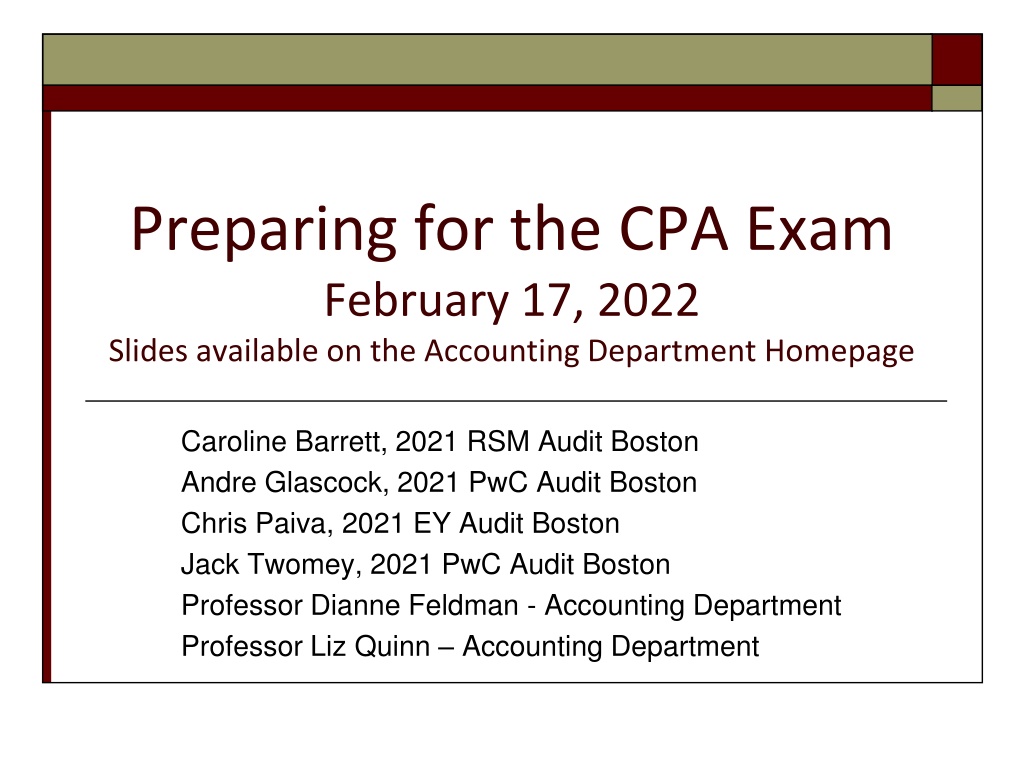
 undefined
undefined




